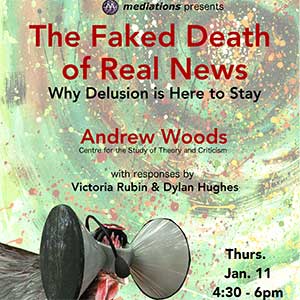 On Thursday, January 11, 2018, Andrew Woods, a first year PhD student from Theory and Criticism at Western, presented his talk entitled “The Faked Death of Real News: Why Delusion is Here to Stay”. The talk generated a lot of interest: some of the attendees were standing in the back for the entire one and a half hour. I will summarize my response to Andrew’s talk briefly.
On Thursday, January 11, 2018, Andrew Woods, a first year PhD student from Theory and Criticism at Western, presented his talk entitled “The Faked Death of Real News: Why Delusion is Here to Stay”. The talk generated a lot of interest: some of the attendees were standing in the back for the entire one and a half hour. I will summarize my response to Andrew’s talk briefly.
I agreed with Andrew that there is no total and complete solution to the, so-called, “problem of fake news”, and the point is evident. He refuted feasibility of technological solutions based on Facebook’s failure with the “disputed tags” and his ad-hoc trials of our Satire Detector which led him to believe in the lower accuracy of identification of satirical fakes from a small sample of the Breitbart and the Guardian (of “mostly factual” nature). I argued that partial solutions are acceptable in the absence of the complete one, in spite of less than optimal accuracy rates. Other language technologies such as machine translation, predictive spelling and speech recognition – went through similar state-of-the art stages, and are now widely accepted in spite of their limitations (e.g., GoogleTranslate, Word SpellChecker, and Siri). I pointed out some methodological flaws in Andrew’s experimentation. “Going after” scientific methods and claiming their ineffectiveness requires rigorous methodology: the evidence to such claims needs to withstand scientific scrutiny. Quite disappointingly, Andrew’s noticeable tendency to site secondary sources deprives his argument of a more nuanced understanding, often admitted in original sources in the form of limitations. Finally, I asked Andrew for his solutions to the problem. While I agree that we should be “intellectually humble” to admit there are no complete solutions as of now, I found Andrew’s denial of the need for Assistive Language Technologies, in principle, to be counter-productive.
Our work was amply critiqued in this speech but we stand by our evidence-based results. The researchers in my lab and I have consistently advocated a hybrid solution and it is described, in popular terms, in this MIT Undark Magazine op-ed “Education and Automation: Tools for Navigating a Sea of Fake News” (2016). We are working on developing a News Verification Browser (2017) with a Clickbait Detector (implemented by Chris Brogly), the Satire Detector and a Falsification Detector (implemented by Nadia Conroy). The idea of the Disease Triangle (the host, pathogen and environment causes to a disease form the epidemiological literature) will be extended to the malaise of fake news as a holistic solution in my keynote speech for the Information Without Borders Conference at Dalhousie, Halifax on February 12, 2018. (See Abstract).
As a reader of this blog, you are invited to leave a comment. If you were in the audience at the Mediations event and have a correction or have something to add, please do so as well.
